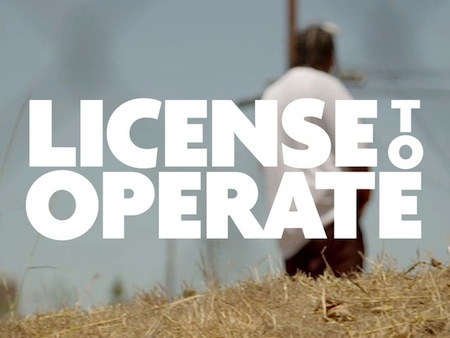These days having a great product, best practices and financial backing are only part of the equation towards success, without a social license to operate you may be shut out of the market. Case in point, the number of pipeline projects that just can’t get a green light and the main thing missing is a social license.

WHAT IS SOCIAL LICENSE
This is the definition given at the Pacific Energy Summit in 2013: “Social license” generally refers to a local community’s acceptance or approval of a company’s project or ongoing presence in an area. It is increasingly recognized by various stakeholders and communities as a prerequisite to development.”
It can take years to develop and can be gone in a moment. In the past it can be argued oil companies had the ability to accomplish virtually anything they wanted assuming they had met government regulations. Today with social media playing such a large role, opposition to projects can be mounted quickly and effectively. So the key for companies is to ensure they have credibility and trust in the community. This means being open about a project and its risks, respecting the communities involved and going beyond the minimal requirements.
The Pacific Energy Summit looked to British Columbia for an example of social license in action. The Kitimat LNG Project and the Haisla Nation. Since at least the mid-1990s, various sites and areas within the Haisla Nation’s traditional territory have been identified as potential sites for export or import facilities for liquefied natural gas (LNG). Proponents have been engaged with the Haisla to advance specific project proposals, and the Haisla have worked toward community benefits associated with these projects. Since its inception, Kitimat LNG has been developing the project with community and First Nations consultation and strict adherence to both provincial and federal government environmental review processes. In 2005, Kitimat LNG and the Haisla Nation signed an agreement in principle and entered a mutually supportive and precedent-setting partnership for the development of LNG in the Haisla’s territory.
One of the key aspects of the partnership was Kitimat LNG’s willingness to alter the location of the facility to an industrial site already developed by the Haisla. Chief Steve Wilson commented: “The Haisla acknowledge the openness Kitimat LNG has shown throughout the EA [environmental assessment] process to take Haisla interests into consideration. Our community has much to offer the project and will gain significantly from the opportunities it will afford our residents.”By engaging with the Haisla Nation early in the process, Kitimat LNG has secured a partner in and advocate for the project, and established the company’s social license to operate in the Haisla’s territory. The relationship includes a range of project-related benefits, such as economic growth, training opportunities, employment, and community and social benefits.
Waiting until something goes wrong before going to the community to seek its support is a recipe for disaster. Gaining social license is like any relationship. It takes time to develop. It might be harder to achieve in the current climate because the oil industry’s overall reputation has been tarnished over the years. While that impacts all companies involved, you can still separate yours from the pack by ensuring you do what it takes to get support from key community players.
Katch Kan is able to help you do just that. Check out our Rig Safety System, Zero Spill System and Kan Cleaning Solutions to see how these products can help you on your way to gaining and maintaining your social license.
